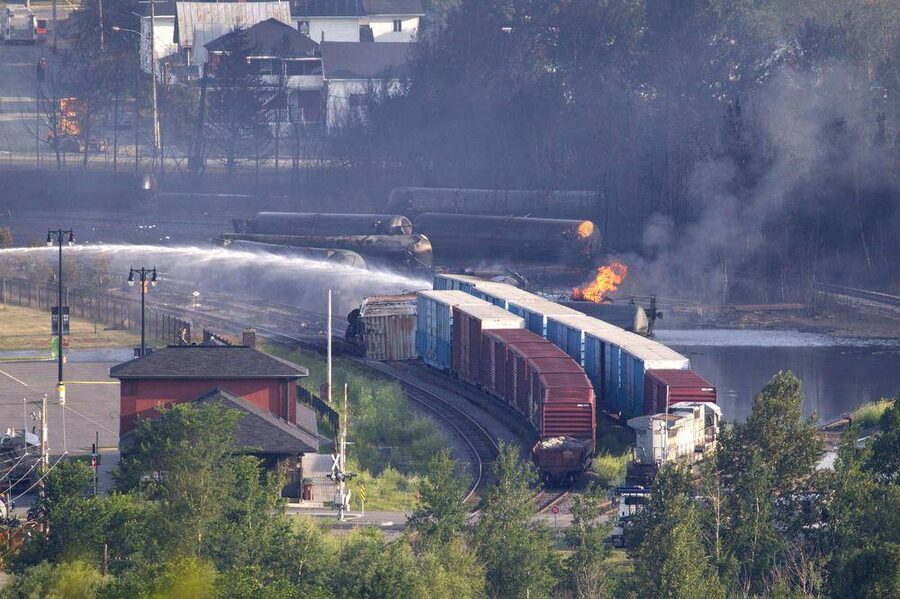On the first day of operation, MMA employed 452.
On the last day of operation, MMA employed 3.
On August 22, 2013, the Canadian Transportation Agency ordered CPR to reinstate delivery to MMA, a move CPR (as one of multiple firms ordered by Quebec’s government to pay for the costly cleanup of oil spilled by MMA at Lac-Mégantic) considered an unacceptable safety risk.
Canadian Pacific chief executive officer Hunter Harrison stated that, “While we disagree with this order, we have taken immediate steps to comply. The CTA, as federal regulator, has satisfied itself that MMA is fit to operate and has adequate insurance to do so. We will review our legal options.”
The CTA also found that “the balance of inconvenience clearly favors MMA as the refusal to grant the interim order would result in the virtual cessation of MMA’s operations.” The CTA also held that issues regarding public safety were none of its concern.
In separate developments also occurring on August 22, 2013, the New Brunswick and Maine Railway company, a division of the J. D. Irving conglomerate, indicated its interest in acquiring the troubled MMA railway, and the Canadian Transportation Agency indicated it would review insurance coverage of federally chartered railways at some point “in the fall”. The same day, the Quebec government hired Paul Hastings, a Quebec bankruptcy specialist firm withstanding in New York State, to represent it in American proceedings.

United States Federal Railroad Administration administrator Joseph C. Szabo wrote to the MMA the following day, stating that “I was shocked to see that you changed your operating procedures to use two-person crews on trains in Canada, but not in the United States. Because the risk associated with this accident also exists in the United States, it is my expectation that the same safety procedures will apply to your operations.”
As of December 18, 2013, the MMA was again allowed to operate between Sherbroooke and Lac-Mégantic, including going through Lac-Mégantic itself, as before the derailment. However, operations within Lac-Mégantic were subject to numerous restrictions, such as a prohibition on transport of dangerous cargo; a train’s manifest being released no less than four hours ahead; no parking on tracks within 4 km (2 mi) of the town center; a conductor and engineer must be on board; and a train’s speed must not exceed 16 km/h (10 mph). On that date, a test train carrying particle board from the local Tafisa factory to Sherbrooke rolled through the town center.
There are plans to reroute the tracks outside the town by changing the track’s route between Nantes and Frontenac, but no timetable has been set. The railway’s assets were sold in a January 21, 2014 Portland bankruptcy auction to Railroad Acquisition Holdings, a subsidiary of Fortress Investment Group as Central Maine and Quebec Railway (reporting mark CMQR). In July 2016, it was announced that all DOT-111 tank cars would be withdrawn from transporting crude oil on railways in Canada by November 1, 2016, although their use for transporting other flammable liquids will be allowed until 2025. A new design of tank car, the TC-117, is the new standard.

MMA and its Canadian subsidiary entered Chapter 11/CCAA bankruptcy protection in August 2013 as a direct result of the Lac-Mégantic rail disaster, a runaway train incident in July 2013 which resulted in an estimated $200 million in damage and the deaths of 47 people. MMA’s assets were sold at auction to Railroad Acquisition Holdings, LLC, a subsidiary of Fortress Investment Group, LLC on January 21, 2014. Fifteen locomotives worth $1.6 million were excluded from the deal and will be sold separately.
The sale was approved by bankruptcy judges on January 23, with the transfer of assets expected to occur on or before March 31, 2014. Railroad Acquisition Holdings, LLC has established a new railroad named Central Maine and Quebec Railway (reporting mark CMQ) to operate the former MMA rail lines. The CM&Q was acquired by Canadian Pacific Railway in June 2020. Following the tragedy, parent company Rail World faced hundreds of millions of dollars in lawsuits and environmental cleanup costs due to the destruction of downtown Lac-Mégantic. It is unclear how much of the disaster’s cost was paid by liability insurance; laid-off MMA workers reported problems obtaining the severance pay owed them and cheques to suppliers were rejected due to non-sufficient funds.
On August 7, 2013, the company filed for bankruptcy protection in both the Quebec Superior Court in Montreal (under the Company’s Creditors Arrangement Act) and the United States Bankruptcy Court in Bangor, Maine (under Chapter 11). According to Burkhardt, the financial obligations of both US and Canadian subsidiaries “now exceed the value of their assets, including prospective insurance recoveries, as a direct result of the tragic derailment at Lac-Megantic. A process under Chapter 11 and the CCAA is the best way to ensure fairness of treatment to all in these tragic circumstances.”

MMA had $50–100 million in US assets and less than $18 million in Canadian assets, including the track itself. It owed $27.5 million on a 2005 Federal Railroad Administration loan, $6 million on a 2009 line of credit issued by the Wheeling and Lake Erie Railway and $3.5 million to various other creditors and tax authorities. J.D. Irving, as owner of NBM Railways, is one of MMA Canada’s largest unsecured creditors at $2.35 million. The total cost of the Lac-Mégantic derailment exceeded $200 million;
MMA had $25 million in liability insurance and $274,000 in its bank accounts at the time of bankruptcy filing. Eighty-five MM&A employees remained on duty after the bankruptcy filing to provide service to all stations on the line except Lac-Mégantic, where all tracks remained blocked since the July 6 derailment and fire. Fifteen of those workers were laid off on August 20.
On August 13, 2013, the Canadian Transportation Agency announced it planned to revoke the MMA’s certificate of fitness effective August 20, 2013, citing inadequate liability insurance; this effectively would have banned the MM&A from operating in Canada.
The August 20 date was later extended until February 1 and subsequently to April 1. Since the insurance policy’s franchise provided no coverage for liability claims under a quarter-million dollars, the Québec Superior Court would set aside this sum in MMA’s bankruptcy as available to victims of a future disaster involving MMA.
On September 12, Transport Canada shut down part of the MMA line after an inspection of six track segments found substandard rail conditions which included a concentration of defective ties on a section near a propane storage facility. A failed October 11 inspection led Transport Canada to embargo the entire line between Lennoxville and Lac-Mégantic.
Orford Express, a special tourist train which used MM&A lines between Magog and Sherbrooke, carried $50–100 million in liability insurance independently of MMA and planned to continue its regular service. A planned special train to carry 5000 visitors from Sherbrooke to Lac-Mégantic between Thanksgiving and Halloween 2013, however, was scrapped as the embargo between Lennoxville and Lac-Mégantic forced Orford Express passengers to travel to Lennoxville and Lac-Mégantic via bus from Sherbrooke.

On December 18, 2013, the rail line from Sherbrooke was reopened through Lac-Mégantic with numerous restrictions, such as a prohibition on transport of dangerous cargo; a train’s manifest being released no less than four hours ahead; no parking on tracks within 4 km (2 mi) of the town center; a conductor and engineer must both be on board; and a train’s speed must not exceed 16 km/h (10 mph).
The first test train carrying particle board from the local Tafisa factory to Sherbrooke rolled through the town center. There were plans to reroute the tracks outside the town by changing the track’s route between Nantes and Frontenac; however, no timetable was ever set.
MMA’s assets were sold at auction to Railroad Acquisition Holdings, LLC, a subsidiary of the Fortress Investment Group, LLC, in January 2014 in an attempt to keep the line open as a going concern. That group’s initial bid for US$14.25 million, placed in December 2013, was the only to offer to buy the entire MMA system. The terms of the sale were announced in mid-February 2014 when the new railroad named Central Maine and Quebec Railway (reporting mark CMQ) was registered in the United States and Canada.
The sale was finalized in March 2014. A joint bid from J.D. Irving Inc.’s Eastern Maine Railway and Pan-Am’s Springfield Terminal Railway offered $8 million for just the Maine portions of the line; the Washington County Railroad offered $750,000 for just the line to Newport. A few hours after court approval of the sale, Great Northern Paper announced a 16-week closure of its mill in East Millinocket. On January 30, trustees filed a US lawsuit on behalf of the bankrupt railway, alleging that World Fuel Services was negligent in failing to properly label the train’s dangerous cargo and that, had its true volatility and inflammability been honestly disclosed on shipping documents, MMA procedures would have prevented it being left unattended on a main rail line.
On May 12, 2014 the Montreal, Maine and Atlantic Railway was charged with 47 counts of criminal negligence; engineer Thomas Harding, manager of train operations Jean DeMaître and rail traffic controller Richard Labrie were arrested and will appear in Lac-Mégantic’s court.